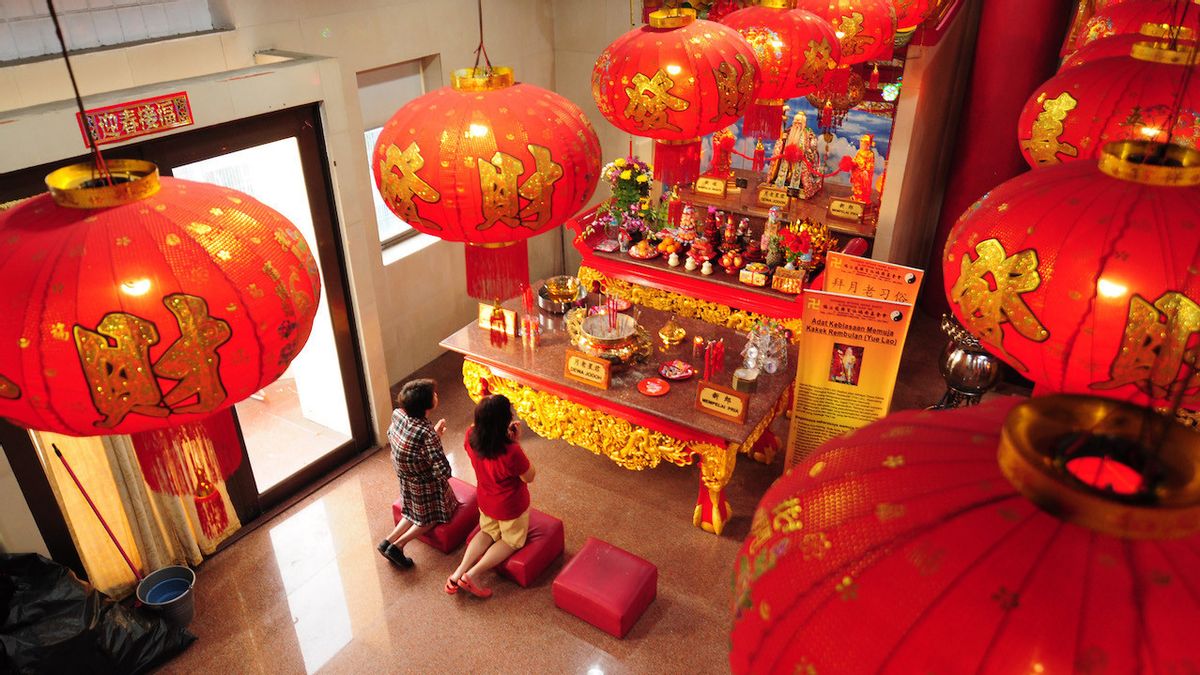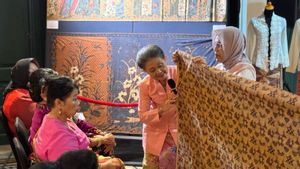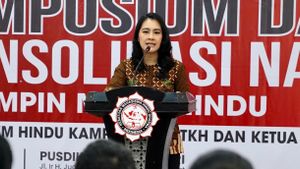JAKARTA - Chinese New Year celebrations in Indonesia are a form of freedom. In the current era, every ethnic Chinese in the archipelago has the right to celebrate Chinese New Year with great joy and joy. Long ago, Chinese New Year was banned in public. Soeharto became the actor behind the Chinese New Year ban in 1967. Then, the 4th President of the Republic of Indonesia, Abdurrahman Wahid (Gus Dur) became the "savior" who perpetuates the Chinese New Year celebrations, at least to this day.
In the Suharto era, all religious ceremonies and customs of the Chinese people were also prohibited. Going far back, since colonial times, the relationship between the Dutch colonial government and the ethnic Chinese is quite strange.
On the one hand they are opposite. On the other hand they are still of attraction. If the two - the Company and the ethnic Chinese - did not cooperate, the economic pulse in the Dutch East Indies would not beat. To the point that Serawan Leonard Blusse called Batavia (Jakarta) a city of Chinese colonies, where without the Chinese, the Company might not be able to live.
In the book The Strange Alliance: Chinese Settlers, Peranakan Women, and the Dutch in the Batavia VOC (1988), Blusse writes about this relationship. According to him, every economic pulse in the archipelago, especially Batavia, played an important role for the Chinese.

They were the pioneers of many things. They could play many roles, be it as coolies, middlemen, taxpayers, masons, as well as trade liaisons between China and the Dutch East Indies (Indonesia).
Slowly, even though it took years after the rioting of the Pacinan in 1740, the Chinese and the Dutch came to live together again. As we have explained in the article "Geger Pacinan 1740: The Flood of Chinese Blood in Batavia", this incident left large wounds among the Chinese in the archipelago.
Even so, as Blusse explained, the two sides were finally able to reconcile. So, it is only natural that Blusse calls the two of them "strange allies."
The strange ally narrative continued after Indonesia's independence. During the reign of the first President of the Republic of Indonesia, Soekarno, the presence of ethnic Chinese in Indonesia was a twisting story as described by Blusse.
Both - the government and ethnic Chinese - are similar in love and hate relationship. On the one hand, they need their role in the economic field. On the other hand, their representation in Indonesian politics is not that much.
Soeharto banned Chinese New YearEntering the reign of the New Order (Order), ethnic Chinese were not recognized as ethnic groups and were categorized as non-native. The demand for self-assimilation with majority tribes was the main option offered by the New Order government.
All this because Suharto issued Presidential Instruction No. 14/1967 on China's Religion, Beliefs and Customs. The instruction stipulates that all Chinese religious ceremonies, beliefs and customs can only be celebrated in a family environment and in closed spaces.
As a result, for example a Chinese living in Jakarta, they must be able to get used to being Betawi people. Quoted from Benny G. Setiono in the Chinese book in Pusaran Politik (2003), the decision is still considered good. Because, initially Soeharto actually wanted to totally ban Chinese things. That intention was canceled.

With this instruction, all celebrations of Chinese ethnic religious traditions, including Imlek, Capgomeh, Pehcun, and so on, are prohibited from being celebrated openly. Likewise, the lion dances (lion dance) and lang-liong (dragon dance) are prohibited from being performed. Even the prohibition also concerns the use of Chinese characters, so that Chinese songs also disappeared from radio broadcasts.
"Thus the ethnic cleansing of Chinese is not only in the physical sense, but also the annihilation of all things Chinese, including culture and religious traditions," wrote Tomy Su in his writing in Kompas newspaper entitled Tides for Chinese New Year (2005).
For that reason, for years, China's minority has been languishing. As a result, the instructions also began to change the designation "Chinese" and began to change back to "Chinese." It may be that the New Order regime thought all policies were for the sake of the ethnic assimilation process. However, in its implementation the policy seems to want to erase the Chinese ethnic group as a distinctive cultural group.
“Chinese language, characters, arts, clothing are prohibited or at least not allowed. Although there are exceptions that are not prohibited, for example Chinese food, stories and silat films. During the New Order era, the celebration of Chinese New Year was practically prohibited or at least not justified, although it is still celebrated internally among citizens of Chinese descent, "wrote Jaya Suprana in the book Bercak-Bercak Harapan (2018).
Gus Dur allows Chinese New Year
The bright spot for ethnic Chinese life that was completely restricted ended after Gus Dur replaced BJ Habibie as the 4th President of the Republic of Indonesia. The father of pluralism, who is known to be brave and consistent in defending the rights of minorities, is the savior.
Thanks to him, ethnic Chinese were allowed to celebrate the Chinese New Year in public for the first time on January 17, 2000. This step became known as a form of respecting minorities in the framework of implementing the philosophy: Bhinneka Tunggal Ika.
Then, the Chinese New Year was officially designated as a national holiday. Gus Dur did not question which bumiputra and nonbumiputra were back. He thought that there was no such thing as a descendant of the indigenous people in Indonesia.
He revealed this because Indonesia was formed by a combination of three races, namely Malay, Astro-melanesian, and Chinese. The grandson of KH Hasyim Asy'ari, the founder of Nahdlatul Ulama, himself admitted that he himself was a crossbreed of Chinese and Arabic.
“During Gus Dur's presidency, Confucianism was recognized as a religion and Imiek became a national holiday. He was the first president and cleric to apologize for the anti-communist violence in 1965. He was also the one who returned the name Papua, which during the New Order was known as Irian Jaya, and did not prohibit the raising of the Morning Star flag belonging to the Papuan people, "Wahyu Muryadi concluded in his writing in Tempo Magazine. entitled The Breaker Of Tebuireng (2010).
MEMORY OtherThe English, Chinese, Japanese, Arabic, and French versions are automatically generated by the AI. So there may still be inaccuracies in translating, please always see Indonesian as our main language. (system supported by DigitalSiber.id)









